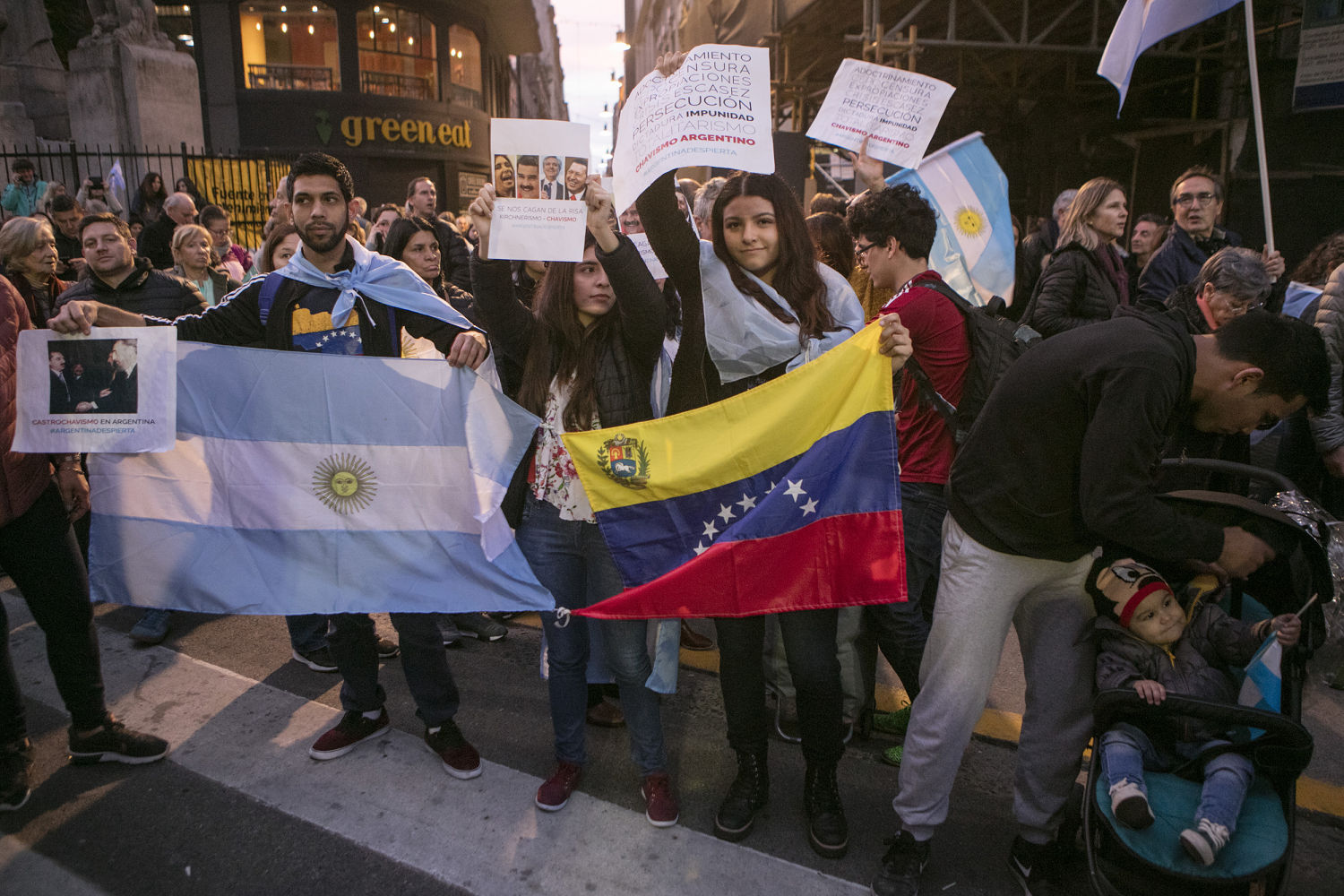How Venezuelan immigrants are supporting right-wing candidates, shaping U.S.

BUENOS AIRES, Argentina — When far-right economist Javier Milei was inaugurated as Argentina’s new president last month, his supporters thronged the streets of the capital, Buenos Aires, bearing the national flag and donning Messi soccer jerseys.
Scattered among the sea of light blue and white were a handful of Venezuelan flags — a recurring sight in Milei campaign gatherings.
Holding one of them was Laura Ruiz. When Milei emerged from the presidential palace to give a speech, Ruiz waved her flag with gusto. Her hope, she said, was for Milei to see the flag — and to know that Venezuelans like her support him.
The 36-year-old immigrant couldn’t register to vote yet in the October election, but she says she became “indirectly” involved in the political process, advocating for Milei and against the left within her circle.
It’s an increasingly common story in Argentina and throughout the Americas. Scarred by economic collapse, widespread corruption and a crackdown on civil liberties associated with socialist leadership back home, many of the millions of recently relocated Venezuelans have lent their support to right-wing movements across the continent. The diaspora’s activism has taken place against a backdrop of warnings from right-wing forces that Venezuela-style socialism risks spreading.
“Venezuela represents something like the specter of communism … The right wing in the region has found in Venezuela a clear image that symbolizes the failures of that system,” said Ariel Goldstein, a political scientist at the University of Buenos Aires.
Throughout his campaign, Milei brandished chainsaws at rallies to underline his support for slashing public spending. In his first speech as president, he said that failure to follow up on those belt-tightening plans would set the country “on a spiral of decay that will bring us the darkness of Chávez and Maduro’s Venezuela,” referring to Hugo Chávez, president from 1998 to 2013, and his handpicked successor, Nicolás Maduro. The two other right-wing figures Milei is often compared to — Donald Trump and Brazil’s Jair Bolsonaro — have tried mobilizing voters with similar rhetoric.
Experts say that there’s been a receptive audience for that kind of discourse among growing Venezuelan diasporas across the region. In recent years, over 7.5 million people have left Venezuela, setting off the most severe migration crisis in modern Latin American history.
Many are starting new lives with a stark opposition to left-wing movements or candidates, which they associate with the dysfunction they had to leave behind.
In the U.S., that dynamic has helped bolster Latino support for Republicans in Florida, contributing to a right-wing shift in recent elections in the longtime swing state. Similar shifts could be in the works in places continent-wide that have a high concentration of recent Venezuelan migrants.
Weeks before Milei won in Argentina, the regional right clinched another victory with Daniel Noboa in Ecuador. He was also buoyed by the Venezuelan diaspora’s support.
“The conditions that forced you to leave Venezuela make you see everything in black and white,” said Eugenio Martínez, a Florida-based Venezuelan political analyst. “But the politics of receiving countries aren’t black and white.”
Active on social media — even if they can’t vote
Originally from the Venezuelan port town of Maracaibo, Elisabet Hernández now lives in Córdoba, Argentina. She said she was anguished by Argentina’s sky-high inflation and supply shortages under the last, left-wing administration, which brought back memories of daily life in Venezuela.
“I became very depressed,” Hernández said.
During Argentina’s presidential campaign last year, Hernández racked up tens of thousands of views on a TikTok account titled “atrapada en socialismo,” or “trapped in socialism.” In her videos, she said she “came from the future” to warn Argentinians of the end results of socialism and she pleaded viewers to back Milei. She also distributed pro-Milei flyers in city parks.
“Lots of people have written to me to let me know that hearing about my experience opened their eyes,” she said.
According to Martínez, the Venezuelan diaspora is more politically engaged than other expatriate communities. After all, there is a widespread perception in the group that the roots of the country’s troubles lie chiefly in the ruling regime’s mismanagement. Many were also driven out by political persecution.
“The Venezuelan diaspora is extremely politically active, both around what’s happening in Venezuela, but also in the local politics of the places they find themselves in now,” Martínez said.
As relative newcomers to the countries they’ve settled in, most…
Read More: How Venezuelan immigrants are supporting right-wing candidates, shaping U.S.

